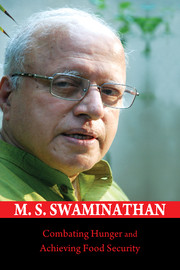Book contents
- Frontmatter
- Contents
- Foreword
- Preface
- Acknowledgements
- Abbreviations
- 1 Genesis and Growth of the Yield Revolution in Wheat
- 2 Our Agricultural Heritage
- 3 Shaping Our Agricultural Destiny
- 4 Thrust on Farm Revival
- 5 Nutri-farm Movement
- 6 Nutrition-sensitive Agriculture
- 7 Food Losses and Food Waste
- 8 Rice in Zero Hunger Challenge
- 9 Monsoon Management
- 10 Importance of Ecological Conservation
- 11 Caring for Ecology and Heritage
- 12 Conserving Biodiversity
- 13 Overcoming Hidden Hunger through Aquaculture
- 14 Biofuels – The Way to Go
- 15 Food Security
- 16 Vigilance for Sustainable Food Security
- 17 Food Security and Social Protection
- 18 Food Security and its Role
- 19 Sustaining the Livestock Revolution
- 20 Challenges in the Year of Science
- 21 Agriculture and Humanism
- 22 Fostering the Science of Science Communication
- 23 Olympic Move for Saving Children
- 24 Youth: The Agents of Change
- 25 Role of Women in Agricultural Production
- 26 Know-how to Do-how
- 27 From Bengal Famine to Right to Food
- 28 Financial Institutions and Fighting Food Inflation
- 29 Public Good Research in Agriculture
- 30 The Future of Indian Agriculture
- Bibliography
17 - Food Security and Social Protection
Published online by Cambridge University Press: 18 December 2015
- Frontmatter
- Contents
- Foreword
- Preface
- Acknowledgements
- Abbreviations
- 1 Genesis and Growth of the Yield Revolution in Wheat
- 2 Our Agricultural Heritage
- 3 Shaping Our Agricultural Destiny
- 4 Thrust on Farm Revival
- 5 Nutri-farm Movement
- 6 Nutrition-sensitive Agriculture
- 7 Food Losses and Food Waste
- 8 Rice in Zero Hunger Challenge
- 9 Monsoon Management
- 10 Importance of Ecological Conservation
- 11 Caring for Ecology and Heritage
- 12 Conserving Biodiversity
- 13 Overcoming Hidden Hunger through Aquaculture
- 14 Biofuels – The Way to Go
- 15 Food Security
- 16 Vigilance for Sustainable Food Security
- 17 Food Security and Social Protection
- 18 Food Security and its Role
- 19 Sustaining the Livestock Revolution
- 20 Challenges in the Year of Science
- 21 Agriculture and Humanism
- 22 Fostering the Science of Science Communication
- 23 Olympic Move for Saving Children
- 24 Youth: The Agents of Change
- 25 Role of Women in Agricultural Production
- 26 Know-how to Do-how
- 27 From Bengal Famine to Right to Food
- 28 Financial Institutions and Fighting Food Inflation
- 29 Public Good Research in Agriculture
- 30 The Future of Indian Agriculture
- Bibliography
Summary
Social protection has seen sharp focus in the development policy agenda during the past decade. There is also a clear trend for making social protection, as well as food security, ‘rights-based’ rather than ‘discretionary’. Yet, no clear consensus has so far emerged concerning many basic design choices and implementation modalities.
In the past, social protection started with the family, where an economically or physically disabled member used to be taken care of by other family members. Gradually, the joint family system gave way to small families, mainly comprising the husband and wife. The absence of effective social protection measures at the family and community levels is one of the causes of suicides among farmers that we observe in Vidarbha and elsewhere. Now that government is assuming responsibility for performing the duties that families and local communities used to undertake in the past, it is important to ensure that the social protection measures initiated by the government do not erode human dignity. Bread with dignity should be the motto for the social protection measures undertaken with public funds.
To be inclusive, social protection should begin with farm families on whom the responsibility for producing adequate quantities of food-grains rest. To be effective, such social protection measures for farmers could take the form of a ‘panchsheel’ for them. The five components of such a package are: soil healthcare, water harvesting and efficient use, technology and inputs, credit and insurance, including old-age pension for farm women and men, and assured and remunerative marketing opportunities. A social protection umbrella based on the panchsheel principle will help rescue small and marginal farmers from poverty and hunger traps.
Access to food, irrespective of economic status is the major goal of the Food Security Act 2011. Unfortunately, all the discussions surrounding this law relate to eligibility criteria. Targeting aims to prevent the diversion of food-grains to those who can afford to purchase them at market price. India is a vast country with diverse experiences. For example, Tamil Nadu operates a universal PDS without any major implementation difficulty. Obviously a universal PDS will be successful only if it is based on the foundation of a culture of honesty. It may be useful to introduce a universal PDS in the 200 high-burden districts that suffer from severe malnutrition, as identified by the Prime Minister's Nutrition Advisory Council.
- Type
- Chapter
- Information
- Combating Hunger and Achieving Food Security , pp. 91 - 94Publisher: Cambridge University PressPrint publication year: 2016
- 1
- Cited by



